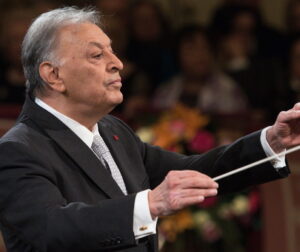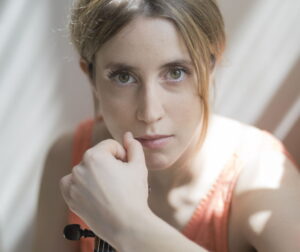
On April 10, the 86-year-old Zubin Mehta, Conductor Emeritus of the LA Phil, led the orchestra in two works, the Violin Concerto by Alban Berg, featuring the Norwegian violinist Vilde Frang as soloist, and the Symphony No. 9 in D minor by Anton Bruckner.
Bruckner and Berg were both Austrian and lived and died in Vienna. While the composers lived at two different though overlapping times, and while they represented two different musical eras—Bruckner the late Romantic and Berg the Second Viennese School—they had more in common than might be evident. Bruckner, building on the symphonic styles of Schubert, Beethoven, and Brahms, expanded the symphony, not only structurally but tonally as well, introducing atonality. Members of the Second Viennese School, including Schoenberg and his pupils Berg and Anton Webern, further expanded tonality to the point of atonality, especially following Schoenberg’s introduction of the 12-tone technique.
The two pieces selected by Mehta for this concert also had similarities. Both were composed shortly before the composers’ deaths, and neither composer heard a performance of his works. Moreover, both compositions were similarly inspired. Berg dedicated his violin concerto to “the memory of an angel,” referring to the untimely death from polio of the 17-year-old daughter of Alma Mahler and Walter Gropius, and Bruckner dedicated his last symphony “to the beloved God.” Regardless of their dedications, both works might be their composers’ own requiems. At Mehta’s age, one wonders if there isn’t something more to his selection of these two pieces, especially the Bruckner.
On Sunday afternoon, after Frang walked on stage to polite applause, Mehta, looking frail as he has for the past few years, followed, walking under his own power but slowly to cheers and thunderous applause from the audience. Mehta, a fixture of the LA Phil, is truly revered by LA Phil concertgoers. He now sits while conducting, and much of the time his arm movements are subdued. Of course, much of the work of a conductor takes place in rehearsal, and the movements of many conductors on stage are more for show than for the orchestra. And it was clear that Mehta had done his work for this concert.

Both he and Frang were perfectly in sync in the violin concerto. The 35-year-old Norwegian navigated the difficult musical terrain of the Berg, which combines long passages of atonality interspersed with some beautiful tonal passages. Frang showed she was adept at both. She more than matched the energy of the piece with some powerful playing that belied her lithe physique.
The second half of the program, which began after an unusually short intermission, was devoted to the Bruckner symphony. This was what all the Brucknerds in attendance were there for; and those who were there because this was a concert in their series and who had not heard this or, perhaps, any other Bruckner symphony were in for a rare treat.
Mehta is a Bruckner aficionado, and he has conducted the ninth symphony both live and in recordings with more than one orchestra, most recently almost exactly one year ago (April 2021) with the Berlin Philharmonic. On Sunday, he brought his love and mastery of this symphony to Walt Disney Concert Hall with his old band, and it was glorious.
Mehta let the first movement unfurl seemingly naturally, but his control of the rapidly changing dynamics (in the entire symphony) was evident. He was careful to allow the solo woodwinds, in particular the flute and oboe, to rise above the sometimes dense orchestral writing, like a ray of sunshine through thick clouds.
Mehta took the second movement slower than it is marked (Bewegt, lebhaft, meaning moving in a lively or animated manner). It was perhaps the tempo of someone who wanted to bring out more of the drama in the movement. Either way, it worked. It should be noted that even though Mehta didn’t perform this movement as animatedly as many other interpretations, his arm movements became more energetic. It was as if the music animated him.
The third movement, marked feierlich (solemn), like the first movement but even more so, is a glorious piece of music, moving as it does from rapturously beautiful passages to dissonant climaxes—a struggle for Bruckner it seems—but resolving in the end quietly and serenely. Mehta conducted this last movement reverentially, holding onto the last wisps of E major played for four measures by the horns and ending with his hands hanging in the air to savor this great work.
On Sunday, the audience in WDCH was treated to one of the most sublime artistic creations in Western music performed by a conductor with a personal attachment to the composer and the symphony, and with an orchestra of the highest caliber with whom he also has a special connection. A rare treat indeed.
—Henry Schlinger, Culture Spot LA
Photos courtesy of LA Phil






Cannot imagine anybody more unsuited to conduct Bruckner.